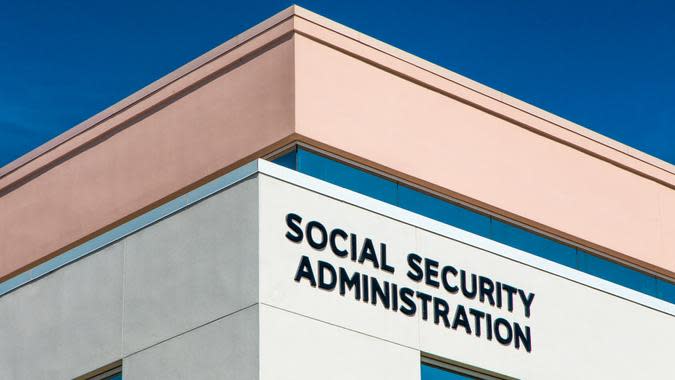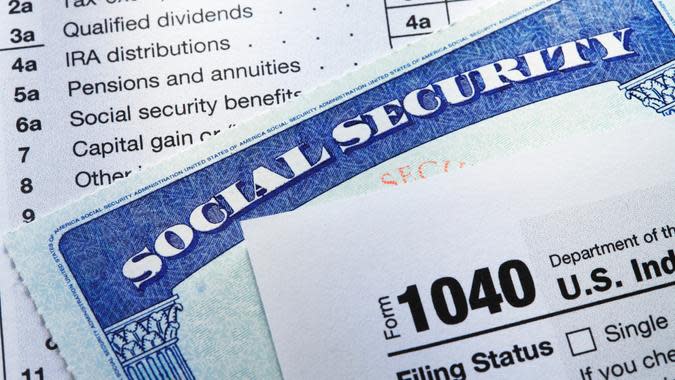Social Security: Experts Debunk 6 Myths

More than 70 million Americans rely on Social Security, Supplemental Security Income or both, according to the Social Security Administration (SSA). More than 62.6 million are on Social Security alone.
Learn: 10 Reasons You Should Claim Social Security Early
Find Out: Social Security Changes That May Be Coming for 2023
In response to rising inflation, checks are 5.9% bigger this year than last, thanks to a cost of living adjustment (COLA) that took effect in January.
Despite the tens of millions of Americans who rely on the program, and despite the program's long history dating back to the New Deal, Social Security is still a source of endless misinformation.
Part of the reason is that the subject matter can be complicated, part of the reason is that the program is a political football and part of the reason is that anyone can write anything they like about it on the internet.
To cut through the informational clutter, GOBankingRates asked a variety of experts to refute the Social Security myths that frustrate them the most.

Myth: Social Security Is Going Bankrupt
Hearing from older generations that Social Security will go bankrupt before they ever get to collect it is a coming-of-age ritual for young people in America. It doesn't help that official-sounding people perpetuate this myth because it fits neatly into arguments for cutting spending or raising taxes.
"There are a number of myths about Social Security that recipients should be aware of," said Greg Lorenzo, CEO of income-based loan repayment service IBR. "One is that Social Security is going bankrupt. This is not the case. The program is funded through payroll taxes."

Myth: Current Benefits Are Guaranteed Forever
Jake Hill, CEO of DebtHammer, agrees with Lorenzo's assessment that Social Security is not going bankrupt.
"This isn't and will never be true so long as FICA and SECA taxes exist," Hill said.
Even so, the program is on a collision course with a funding shortfall.
"It's expected that in the next 10 to 15 years, the current Social Security surplus will be gone and we'll reach a deficit wherein recipients will only get roughly 80% of their lifetime contributions," Hill said.
The SSA backs that up. Because of changes made to the program in 1983, benefits will be fully payable only until 2037, when the trusts that fund the program will be depleted, according to the SSA's own report. Then, benefits will be reduced by 24%. But Congress can still prevent that from happening.
"It would be on the government to put a program in place to shore up this number and ensure Social Security pays out the required amount," Hill said.

Myth: Social Security Alone Is a Viable Retirement Plan
There's a widespread belief that people pay into Social Security their whole working lives; and, therefore, the program pays them enough to get by in retirement when they leave the workforce.
The truth is that Social Security was never meant to be a substitute for retirement savings.
"A common myth that is especially false for the younger generations is that Social Security will be able to support retirees fully," said Carter Seuthe, CEO of Credit Summit. "The truth is that at this point it's not possible to live on Social Security alone, so people shouldn't assume that they will be taken care of entirely by it."

Myth: You Have to Take Social Security Upon Retirement
Social Security is a program to support retirees, so you have to start collecting benefits when you retire -- or so says an all-too-common myth.
"Something far too many retirees believe is that they must begin taking Social Security as soon as they retire," said Danielle Harrison, a fee-only CFP and founder of Harrison Financial Planning. "Oftentimes, this does not make the most sense financially. For many, they could be much better off delaying their Social Security benefits and living off of their other retirement and investment accounts.
"By doing this, they can enjoy a larger monthly benefit and have a steady income stream with annual cost-of-living adjustments that they are able to rely on for the remainder of their life. This can be incredibly valuable in high inflationary periods like what we are experiencing now."

Myth: Benefits Are Tax-Exempt
One of the biggest misconceptions is that recipients already paid into the program through their payroll taxes so benefits can't be taxed when it's time to collect.
Here, too, the legend doesn't hold up to the facts on the ground.
"Another myth is that benefits are not taxable," Lorenzo said. "This is not always true. Benefits may be taxable depending on the recipient's income."
According to the SSA:
Individuals earning between $25,000 and $34,000 may have to pay taxes on up to 50% of their income. The threshold is $32,000 to $44,000 for couples filing jointly.
Up to 85% of your income might be taxable if you earn more than $34,000, or $44,000 for couples filing jointly.

Myth: Wealthier People Don't Receive Benefits
Although Social Security can be taxed, it can never be denied and its benefits can't be reduced, no matter how much money you earned or accumulated over the course of your life.
"Social Security benefits at this time are not means tested and there is no income limit for eligibility or reduction in benefits because of any pre-existing savings," said David Reischer, Esq., SSDI attorney and expert at LegalAdvice.com. "This may change in the years ahead as the Social Security trust fund becomes depleted."
More From GOBankingRates
This article originally appeared on GOBankingRates.com: Social Security: Experts Debunk 6 Myths
